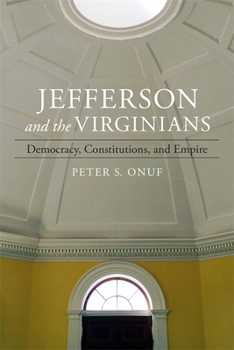Jefferson and the Virginians: Democracy, Constitutions, and Empire
(Part of the Walter Lynwood Fleming Lectures in Southern History Series)
Select Format
Select Condition 
Book Overview
In Jefferson and the Virginians, renowned scholar Peter S. Onuf examines the ways in which Thomas Jefferson and his fellow Virginians--George Washington, James Madison, and Patrick Henry--both conceptualized their home state from a political and cultural perspective, and understood its position in the new American union. The conversations Onuf reconstructs offer glimpses into the struggle to define Virginia--and America--within the context of the upheaval of the Revolutionary War. Onuf also demonstrates why Jefferson's identity as a Virginian obscures more than it illuminates about his ideology and career.
Onuf contends that Jefferson and his interlocutors sought to define Virginia's character as a self-constituted commonwealth and to determine the state's place in the American union during an era of constitutional change and political polarization. Thus, the outcome of the American Revolution led to ongoing controversies over the identity of Virginians and Americans as a "people" or "peoples"; over Virginia's boundaries and jurisdiction within the union; and over the system of government in Virginia and for the states collectively. Each debate required a balanced consideration of corporate identity and collective interests, which inevitably raised broader questions about the character of the Articles of Confederation and the newly formed federal union. Onuf's well-researched study reveals how this indeterminacy demanded definition and, likewise, how the need for definition prompted further controversy.Format:Hardcover
Language:English
ISBN:0807169897
ISBN13:9780807169896
Release Date:October 2018
Publisher:LSU Press
Length:208 Pages
Weight:1.70 lbs.
Dimensions:1.0" x 6.3" x 9.1"
Related Subjects
HistoryCustomer Reviews
0 rating





